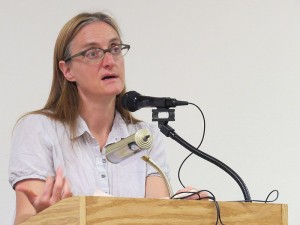
As a Mills first year student and longtime Oakland resident, I’m writing this piece to spark a discussion about how Mills as an institution can create a stronger dialogue with the Oakland community. I am disappointed by how the panel with the author of Farm City, the assigned book for the incoming class, went. What was Mills’ intention in bringing the author and having this discussion? I, too agree with all the critiques and outrage from students around the book.
Being born and raised in Oakland, I thought the book lacked the nuances about gentrification, white privilege and understanding of systemic issues in Oakland. I have heard that this book was chosen for incoming students because it would be controversial.
While I do agree that it is important to read writing just for the purpose of critique there is a way of going about critiquing that is constructive. We were instructed to read this book over the summer. The only discussion we had about it was in class on Tuesday, two days before the panel with the author would be held.
Not discussing the book until two days before left no time for instruction on how to critique in a way that creates movement.
Having more time to prepare would have also allowed more students to come up with poignant and probing questions. We all agreed that there were many issues with the book and and the classroom discussion was a much needed outpouring of anger. However, I felt much more time was spent combing over everything wrong with the book than was spent creating questions that would challenge the author in a constructive, academic way.
One good question that emerged was: “What is Novella doing with her privilege and has she changed anything with her newer projects to address these critiques?” I was excited to hear the author answer this question and was saddened that there wasn’t space created for her to be able to address it.
Students are fed up with the especially volatile and triggering political climate (as they should be). So when put into a room with an out-of-touch author that doesn’t understand the impact of her words on people of color, without some guidelines, you get an hour of students yelling, a defensive author and no progress.
A few students had very articulate questions but Novella did not understand them and things got further and further from the point at hand.
A major critique of the book I had was about how Novella approached urban farming. I think it would have been a lot more effective if she had come into the community aware of her status as an outsider. From there, observed, listened and asked questions about what that community thinks they do well and where they think their struggles are.
And then she could have said something along the lines of “I love farming, I’m a resource if the community wants to collaborate.” Understanding that this community has its own strengths and needs that they are aware of and that it is not her place as an outsider to decide that. Would Novella understand this if I told her? I don’t know.
But I do know that if explained like that and she still did not understand or was open to understanding then she should not be asked to speak at Mills. She was apparently informed of the types of critiques we had about the book beforehand but it seemed as if the author had never heard them before. I don’t think she should have been asked to come if she wasn’t open to understanding the impact of her book.
There was a way in which Mills could have approached this.
There are ways to respectfully critique pieces of work that create a dialogue and deepen understanding. I believe Novella left the event knowing less about the discrepancies in her book than before and completely turned off to ever understanding them.
Which is a shame because she really needs to understand the implications of the book.
While some don’t feel it is their job to educate, Mills, as an institution of learning, has the sole purpose of educating. I would have hoped that this could have been a learning experience for Novella and if she was incapable of understanding these critiques than that should have been determined beforehand and she should not have come.
I felt this reflected badly on Mills as an institution. If the point is to create new understanding and tolerance amongst difference, I believe this was a poor way of going about it. Thank you for hearing my thoughts.
